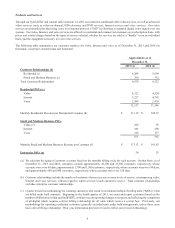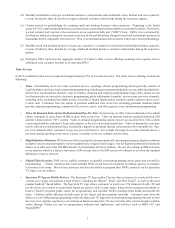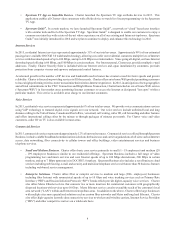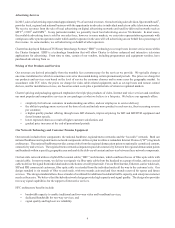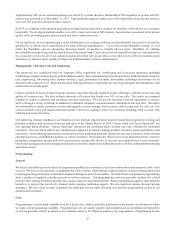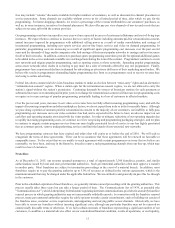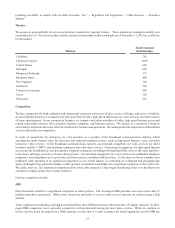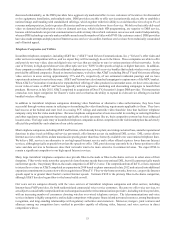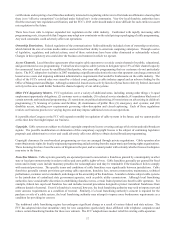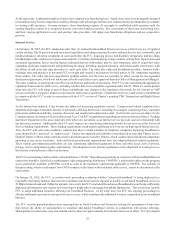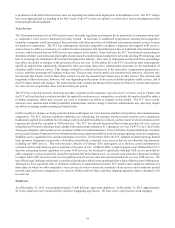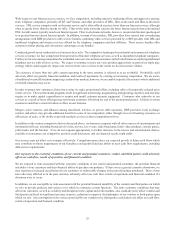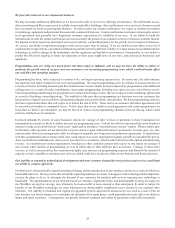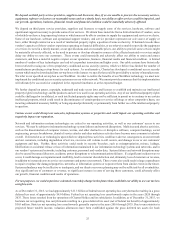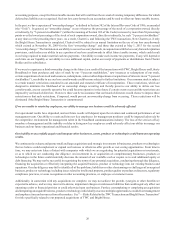Charter 2015 Annual Report Download - page 31
Download and view the complete annual report
Please find page 31 of the 2015 Charter annual report below. You can navigate through the pages in the report by either clicking on the pages listed below, or by using the keyword search tool below to find specific information within the annual report.16
Privacy and Information Security Regulation. The Communications Act limits our ability to collect and disclose subscribers’
personally identifiable information for our video, voice, and Internet services, as well as provides requirements to safeguard such
information. We are subject to additional federal, state, and local laws and regulations that impose additional restrictions on the
collection, use and disclosure of consumer, subscriber and employee information. Further, the FCC, FTC, and many states regulate
and restrict the marketing practices of cable operators, including telemarketing and online marketing efforts. Various federal
agencies, including the FTC, are now considering new restrictions affecting the use of personal and profiling data for online
advertising.
Our operations are also subject to federal and state laws governing information security. In the event of an information security
breach, such rules may require consumer and government agency notification and may result in regulatory enforcement actions
with the potential of monetary forfeitures. The FCC has recently used the existing authority under its privacy and security
requirements for telecommunications services to bring enforcement actions against several companies companies (including one
cable operator) for failing to protect customer data from unauthorized access by and disclosure to third parties, with resulting
settlements ranging from $595,000 to $25 million. Similarly, the FTC and state attorneys general regularly bring enforcement
actions against companies related to information security breaches and privacy violations. Congress and several state legislatures
are considering the adoption of new data security and cybersecurity legislation that could result in additional network and
information security requirements for our business.
On February 12, 2014, the National Institute for Standards and Technologies (“NIST”), in cooperation with other federal agencies
and owners and operators of U.S. critical infrastructure, released a voluntary framework that provides a prioritized and flexible
model for organizations to identify and manage cyber risks inherent to their business. The NIST cybersecurity framework was
directed by an Executive Order and a Presidential Policy Directive issued in 2013, and it is designed to supplement, not supersede,
existing cybersecurity regulations and requirements. Several government agencies have encouraged compliance with the NIST
cybersecurity framework, including the FCC, which is also considering expansion of its cybersecurity guidelines or the adoption
of cybersecurity requirements. We cannot predict what proposals may be adopted or how new legislation and regulations, if any,
would affect our business.
MDUs / Inside Wiring. The FCC has adopted a series of regulations designed to spur competition to established cable operators
in MDU complexes. These regulations allow our competitors to access certain existing cable wiring inside MDUs. The FCC also
adopted regulations limiting the ability of established cable operators, like us, to enter into exclusive service contracts for MDU
complexes. In their current form, the FCC’s regulations in this area favor our competitors.
Pole Attachments. The Communications Act requires most utilities owning utility poles to provide cable systems with access to
poles and conduits and simultaneously subjects the rates charged for this access to either federal or state regulation. In 2011 and
again in 2015, the FCC amended its existing pole attachment rules to promote broadband deployment. The 2011 order allows for
new penalties in certain cases involving unauthorized attachments, but generally strengthens the cable industry's ability to access
investor-owned utility poles on reasonable rates, terms, and conditions. Additionally, the 2011 order reduces the federal rate
formula previously applicable to “telecommunications” attachments to closely approximate the rate formula applicable to “cable”
attachments. The 2015 order (which may still be appealed by utility pole owners) continues the reconciliation of rates, effectively
closing the remaining “loophole” that potentially allowed for significantly higher rates for telecommunications than for "cable"
attachments in certain scenarios. Neither the 2011 order nor the 2015 order directly affect the rate in states that self-regulate (rather
than allow the FCC to regulate pole rates), but many of those states have substantially the same rate for cable and telecommunications
attachments.
Although the 2011 and 2015 orders do not impact the status quo treatment of cable-provided VoIP service as an unclassified service
eligible for the favorable cable rate, the issue has not been fully resolved by the FCC, and a potential change in classification in
a pending proceeding could adversely impact our pole attachment rates in states or for periods of time in which the cable rate is
or was lower than the telecommunications rate. Additionally, although the FCC’s 2015 reclassification of broadband Internet
access as a telecommunications service also set forth the FCC’s intention that pole rates not increase as result, that reclassification
ruling could adversely impact our pole attachment rates in states or for periods of time in which the cable rate is or was lower than
the telecommunications rate.
Cable Rate Regulation. Federal law strictly limits the potential scope of cable rate regulation. Pursuant to federal law, all video
offerings are universally exempt from rate regulation, except for a cable system’s minimum level of video programming service,
referred to as “basic service,” and associated equipment. Rate regulation of basic service and associated equipment operates
pursuant to a federal formula, with local governments, commonly referred to as local franchising authorities, primarily responsible
for administering this regulation. The majority of our local franchising authorities have never certified to regulate basic service
cable rates. In 2015, the FCC adopted an order (which is now under appeal) reversing its historic approach to rate regulation


